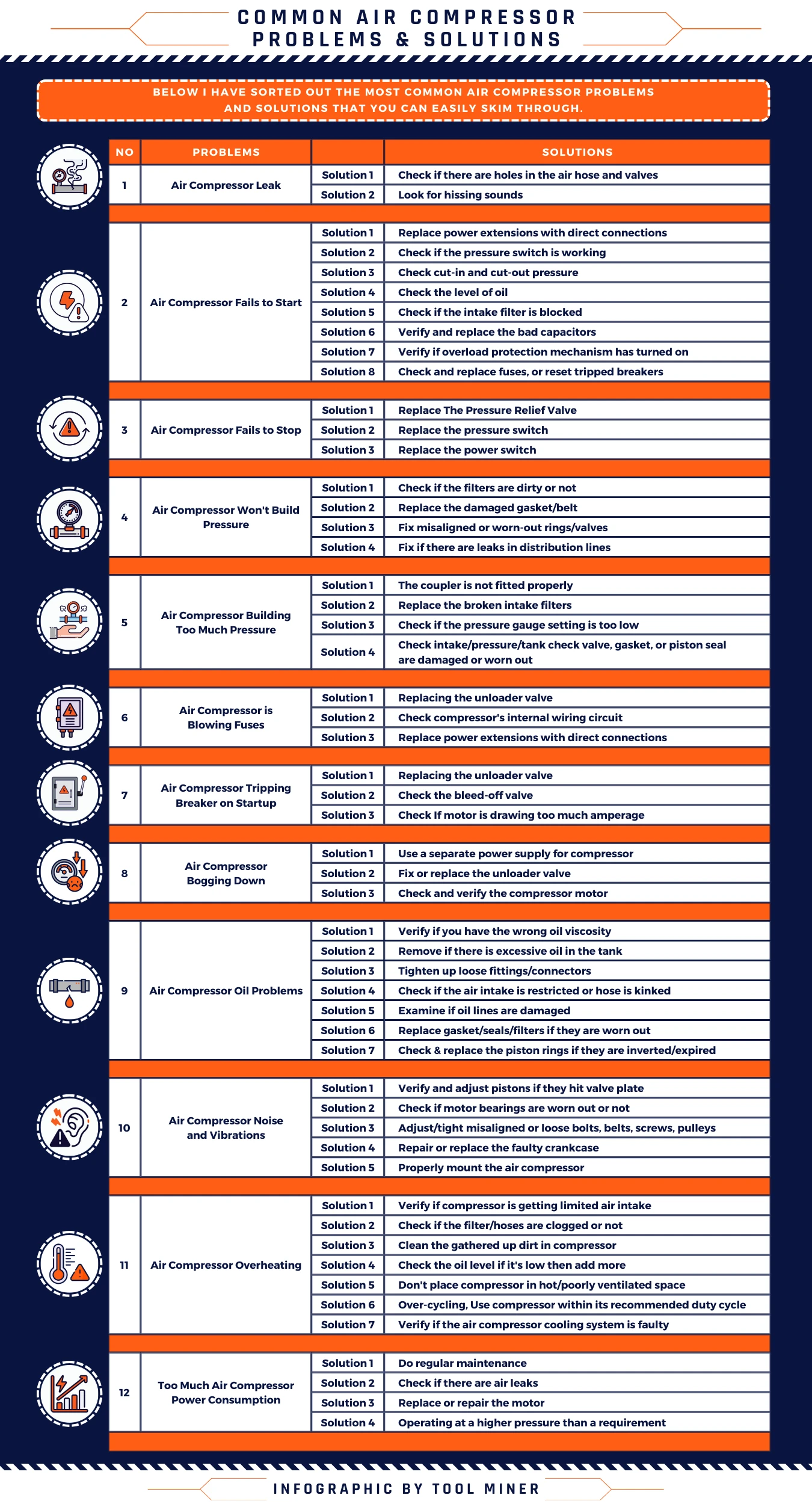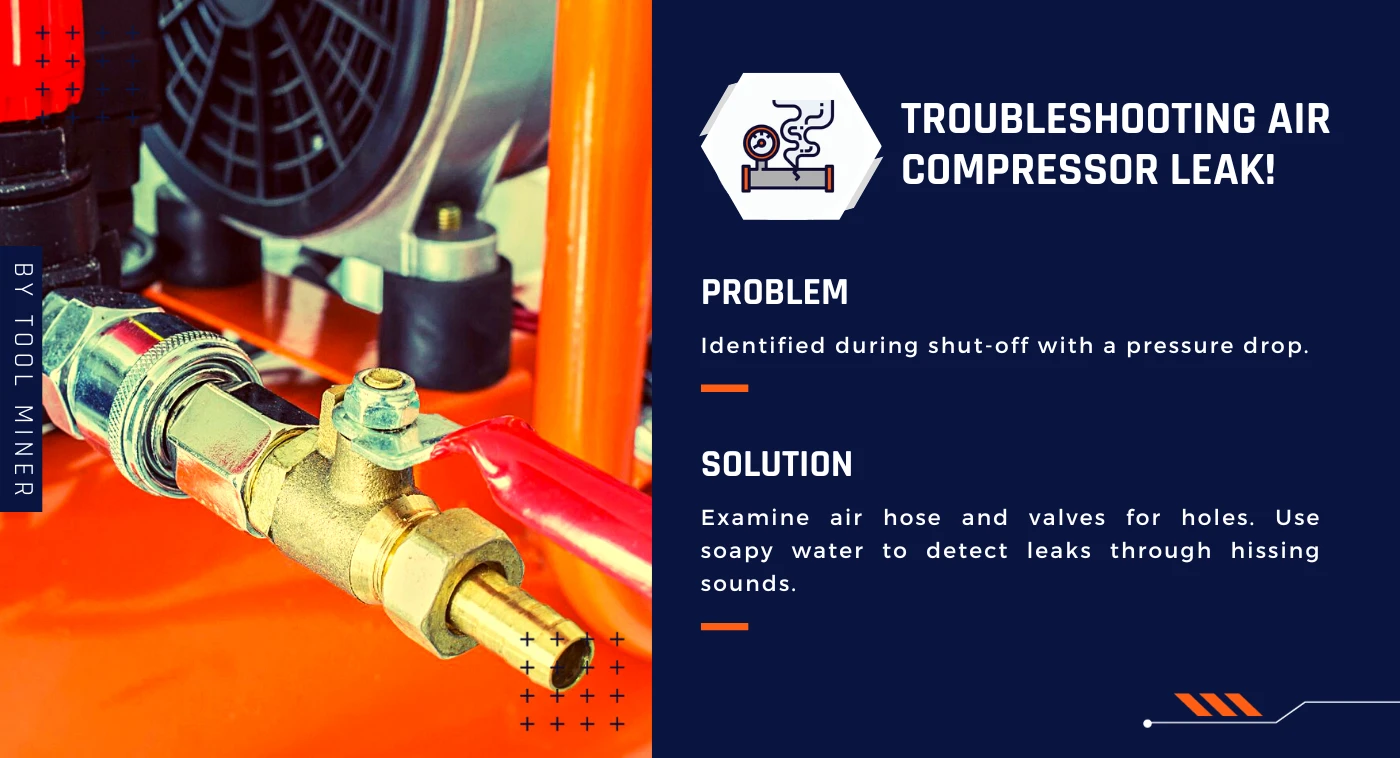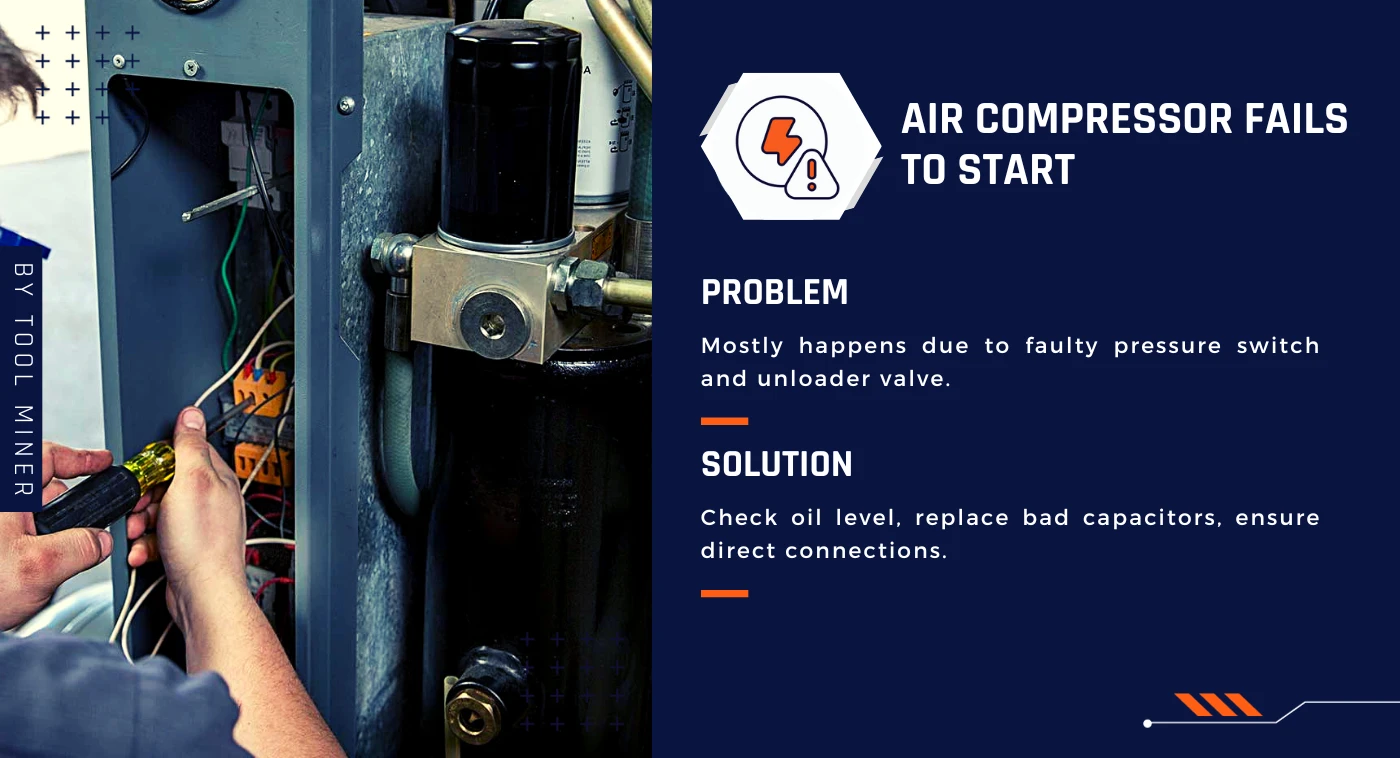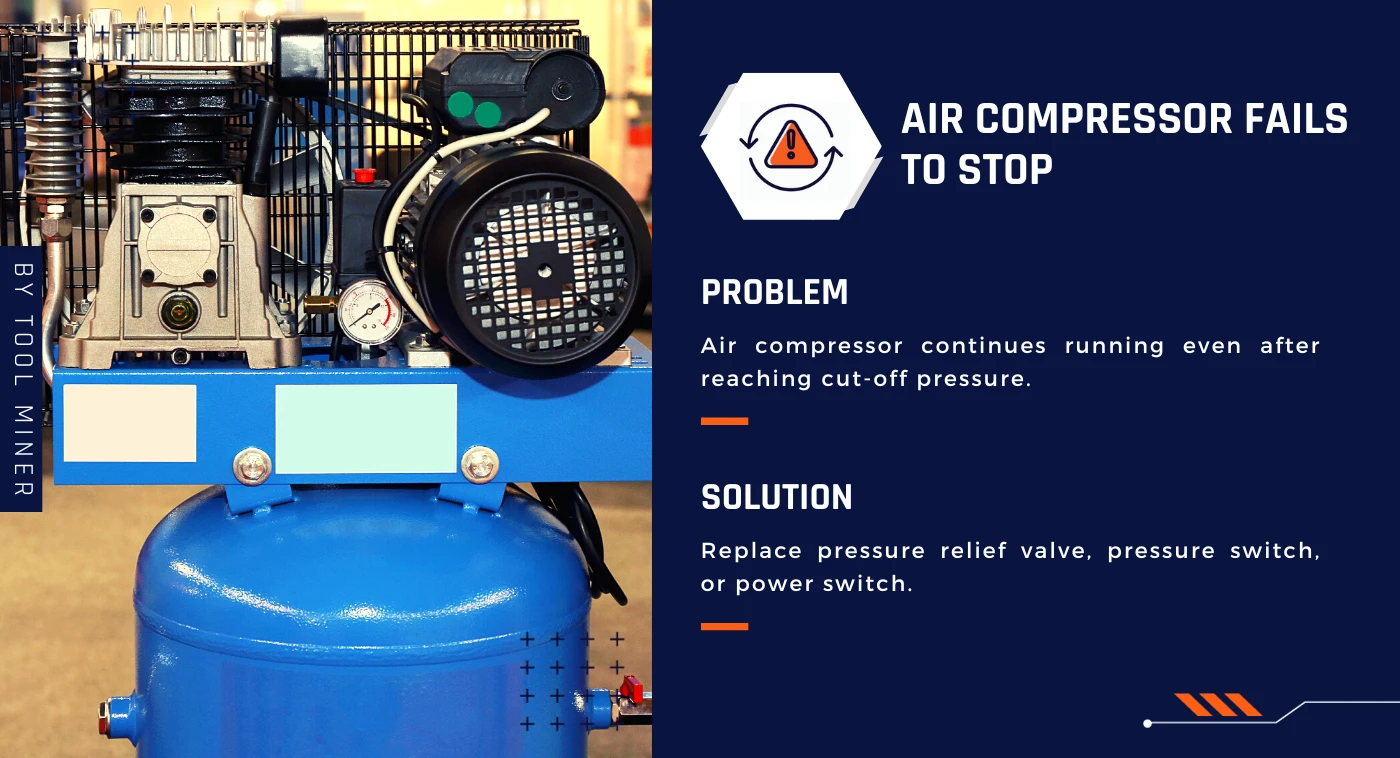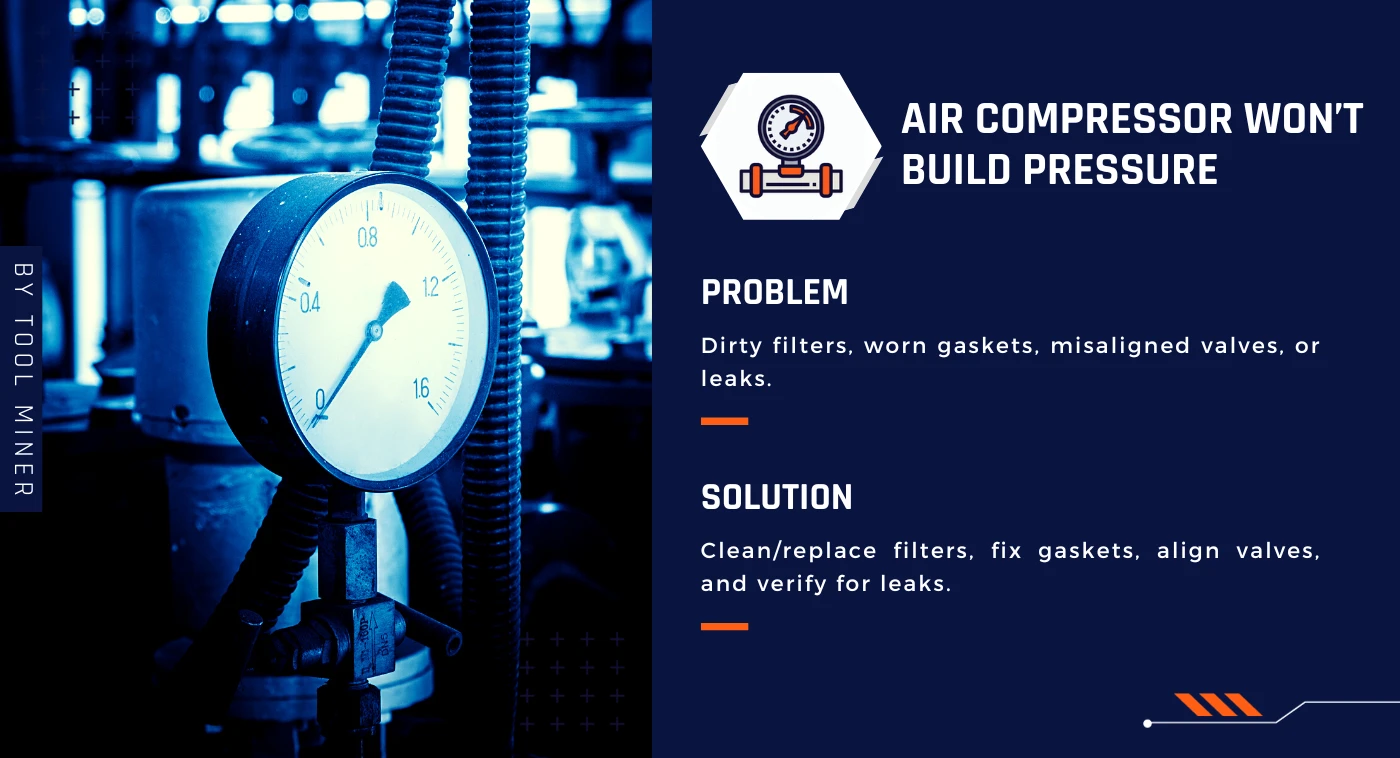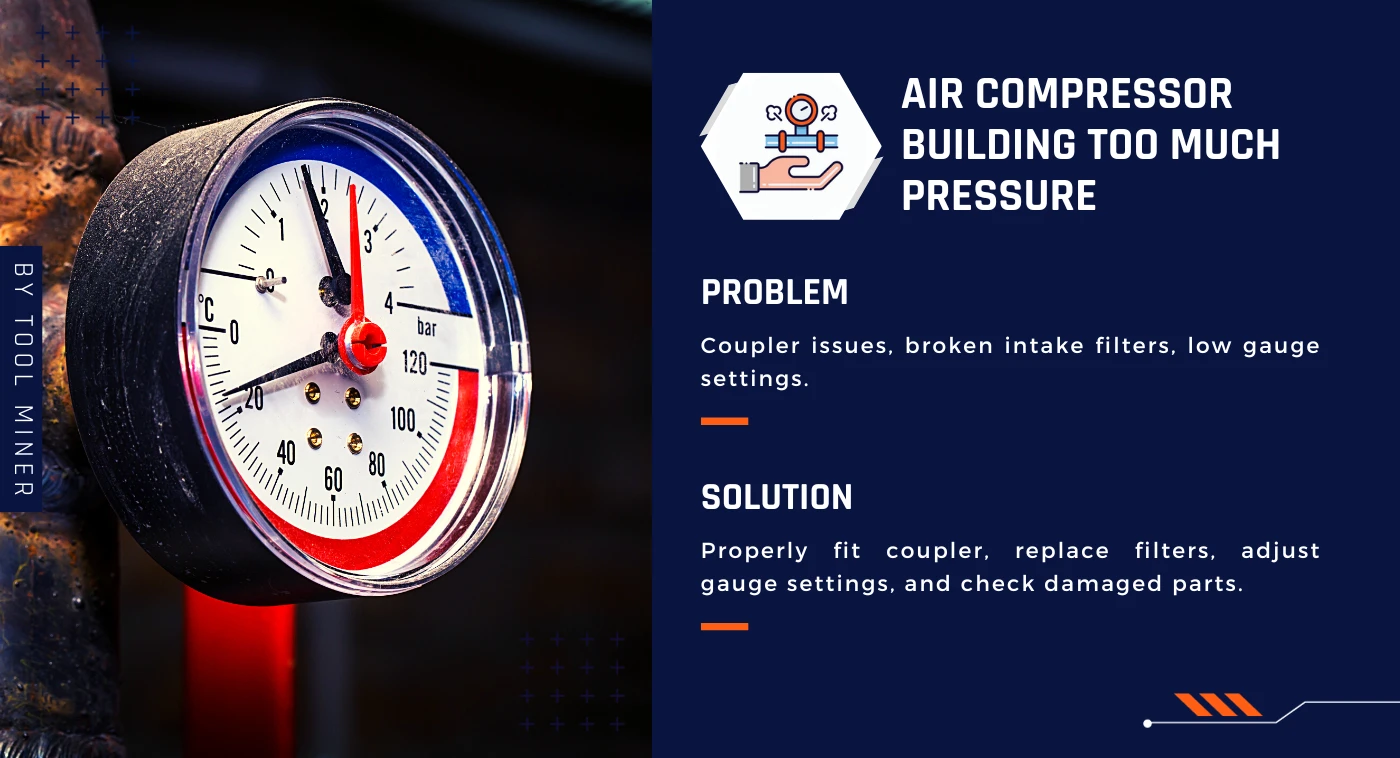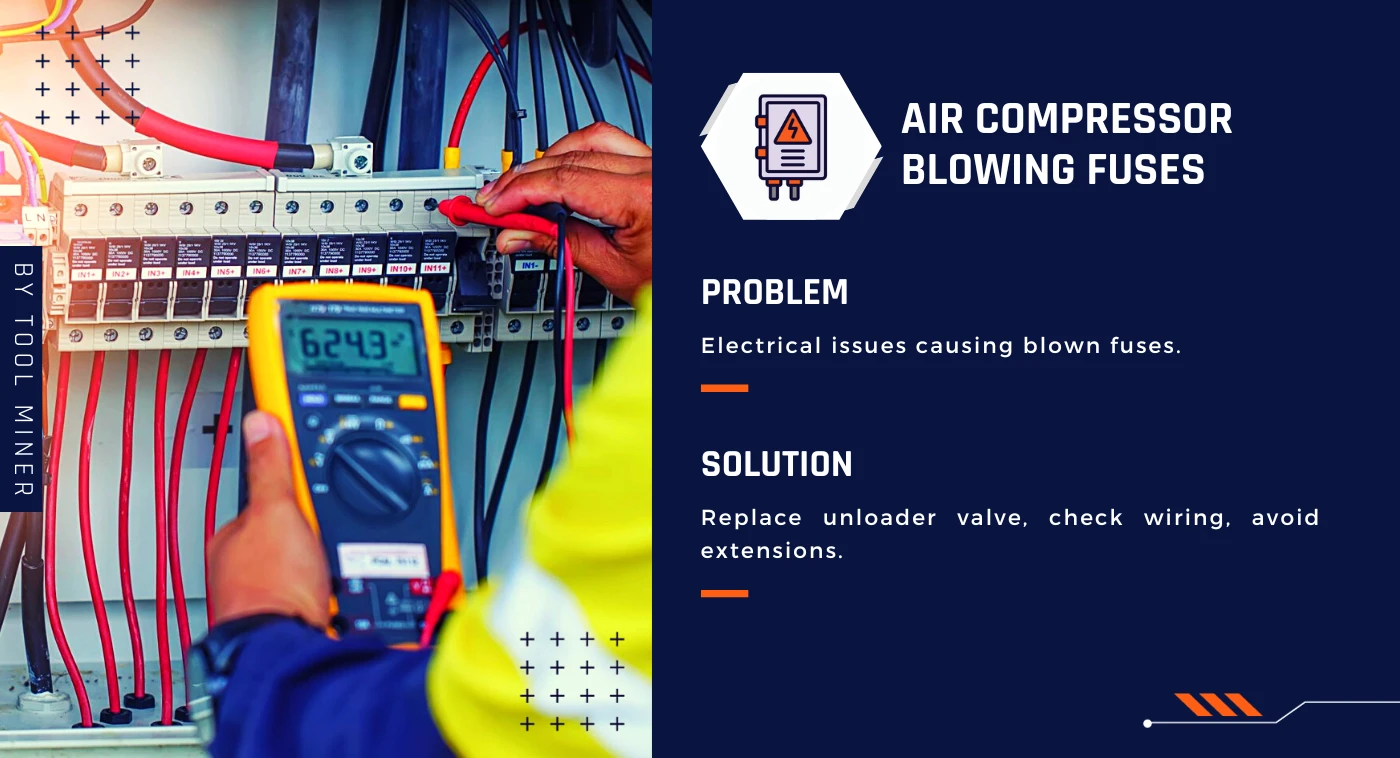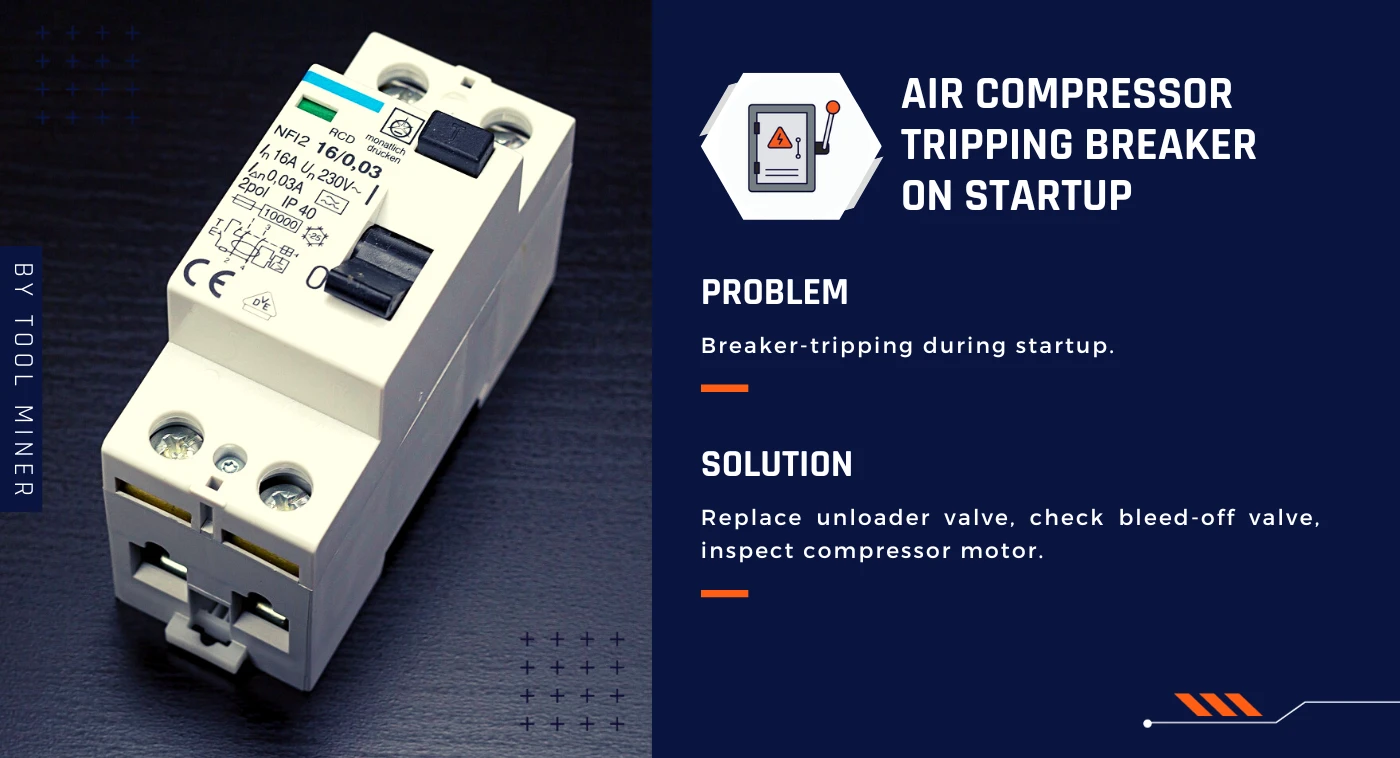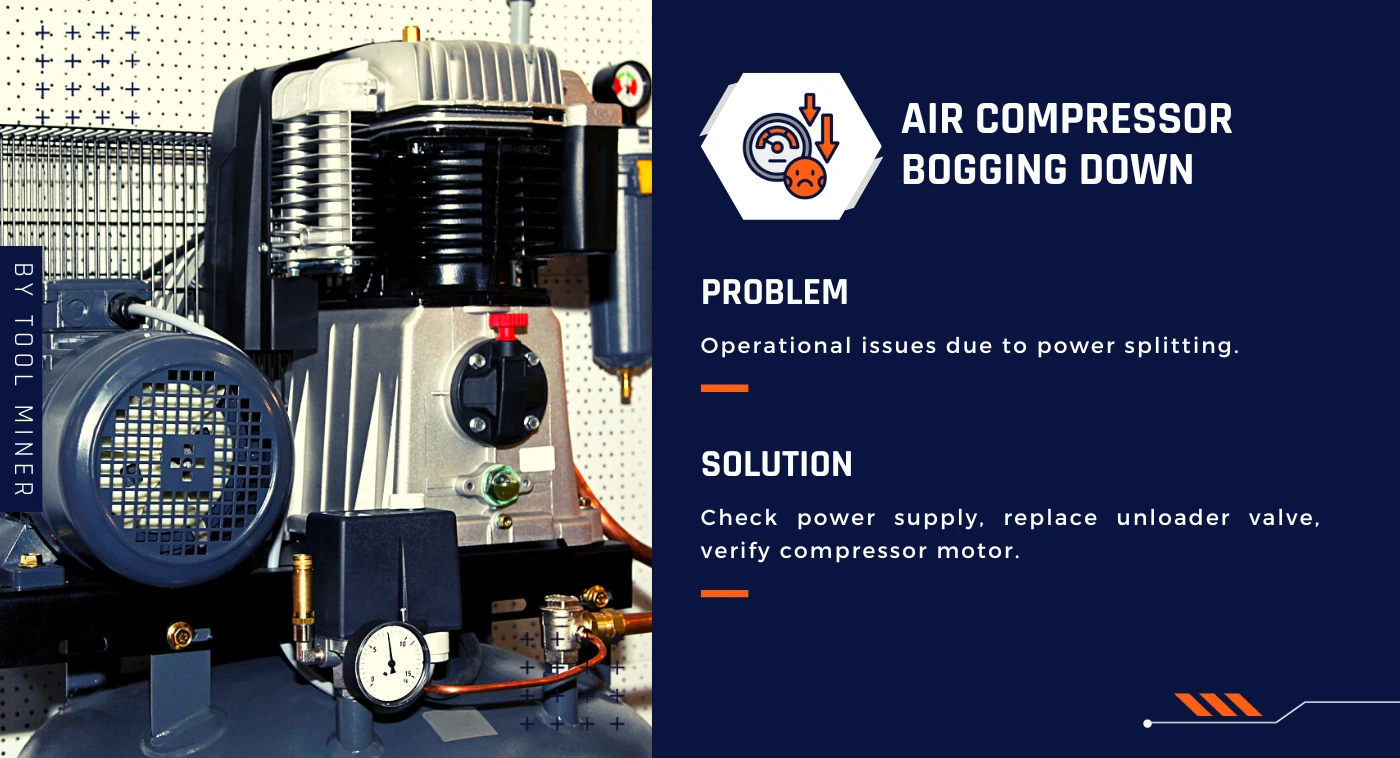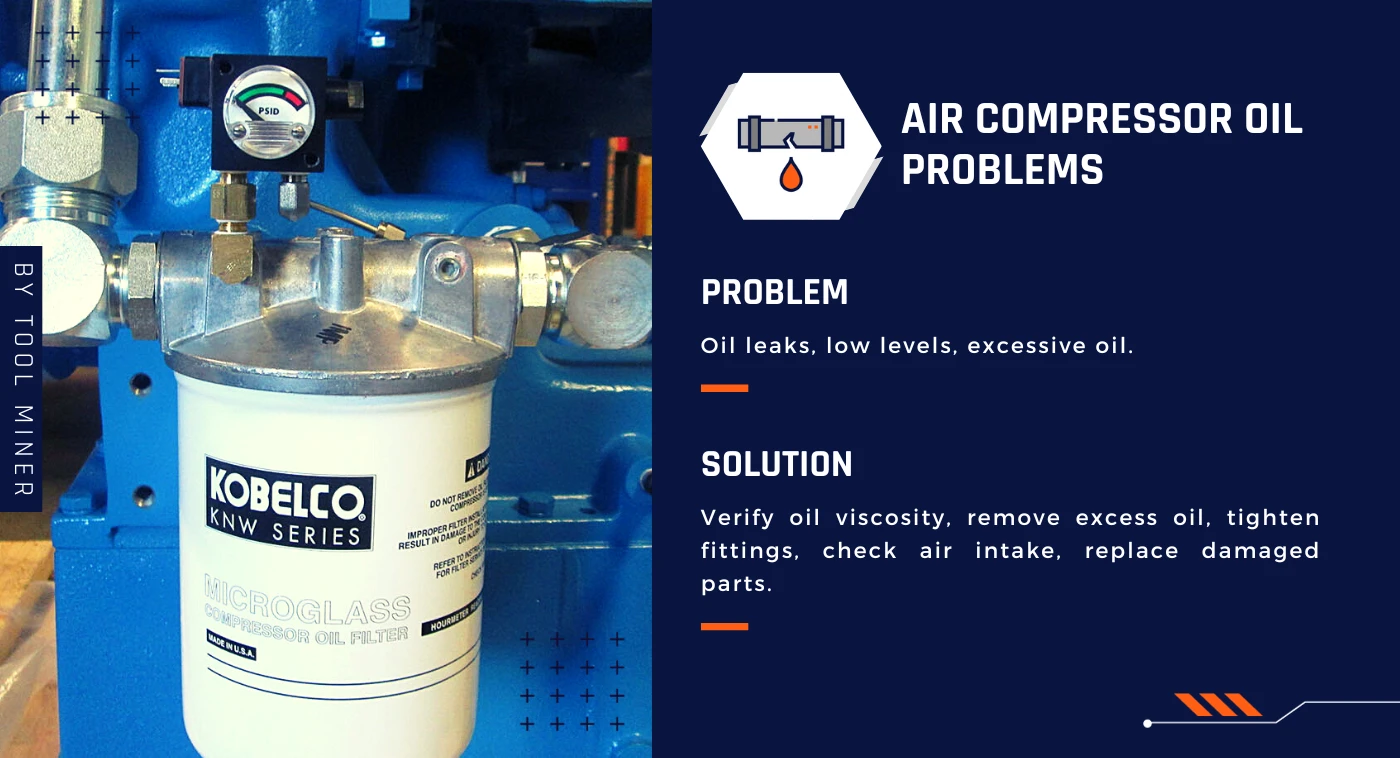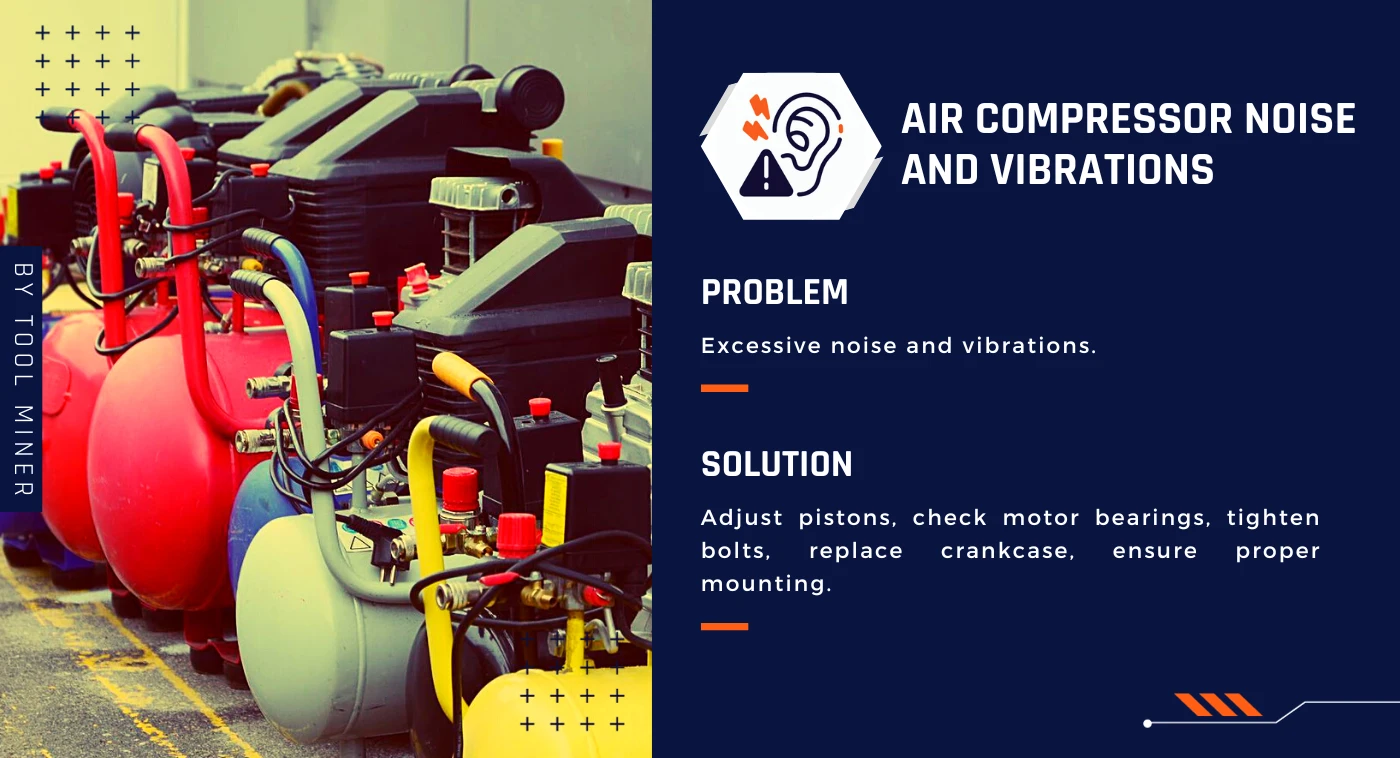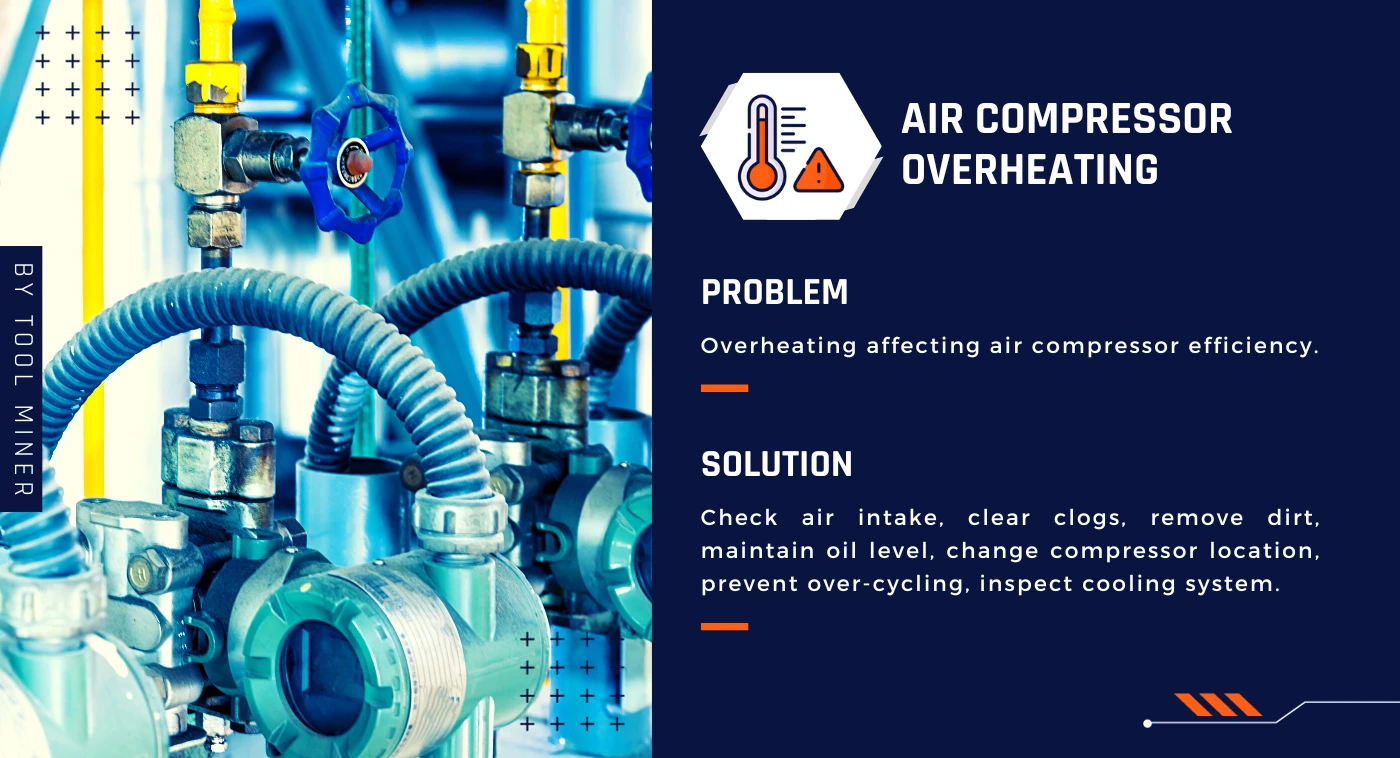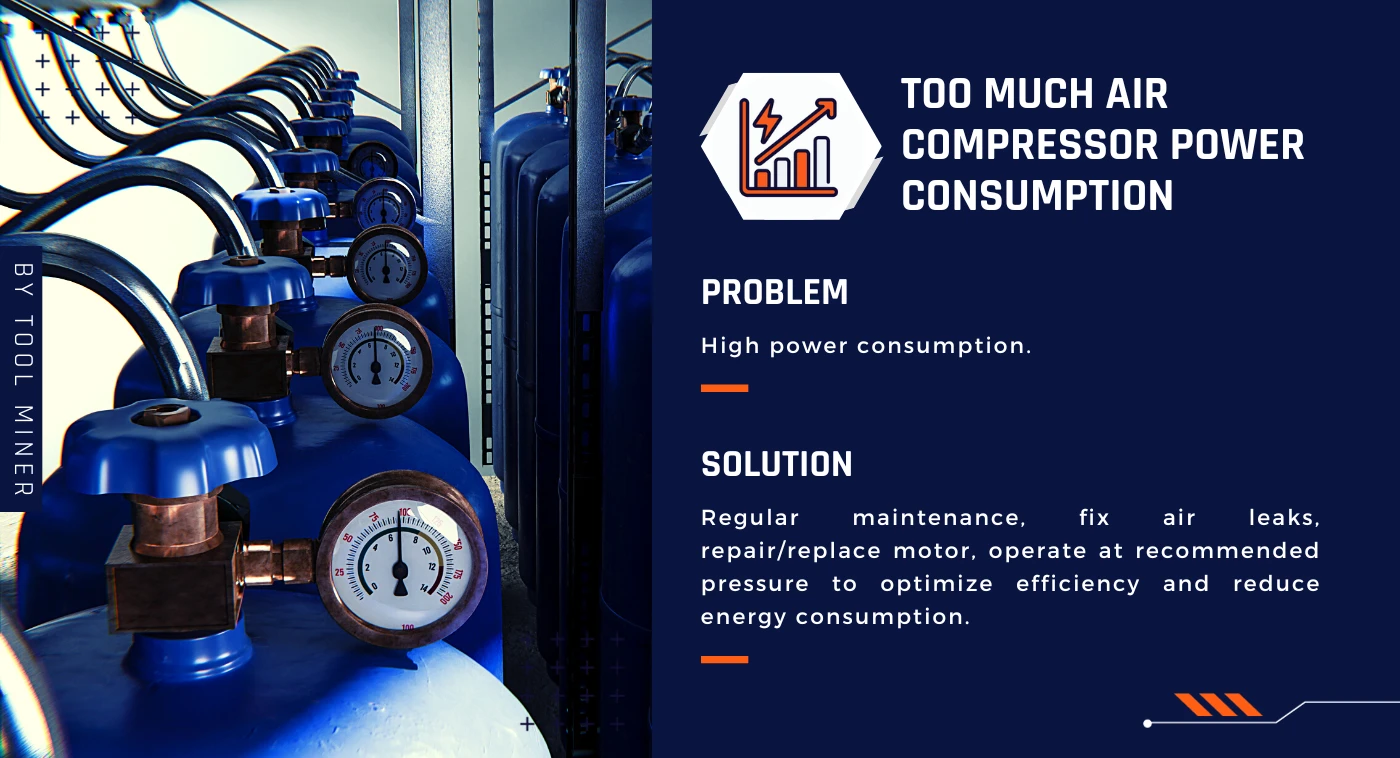10+ Most Common Air Compressor Problems and Solutions 2024
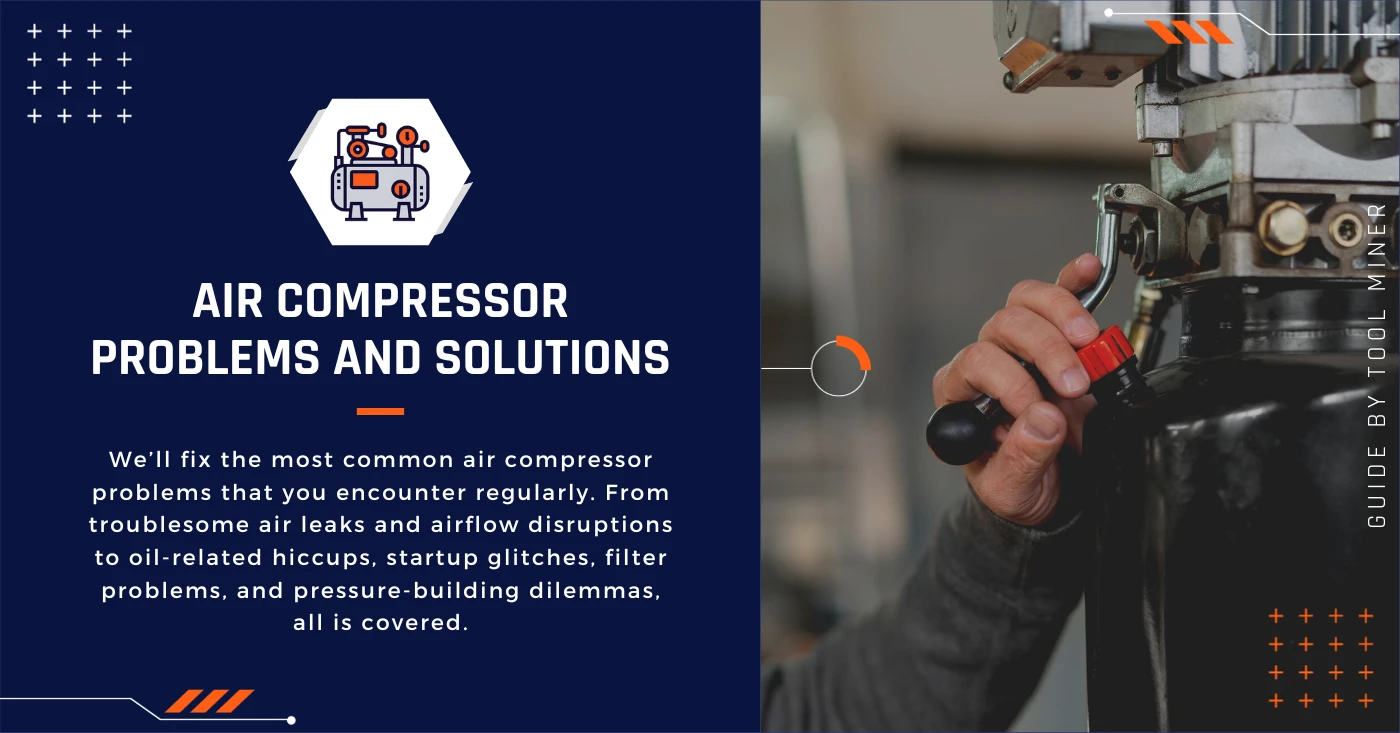
Air compressors are the backbone of various industries, from powering pneumatic tools to supporting automotive work. Modern air compressors are built to be robust, versatile, and adaptable, catering to a range of needs.
However, even these robust machines require scheduled maintenance due to their demanding tasks, making them prone to problems.
In this guide, we’ll fix the most common air compressor problems that you encounter regularly. From troublesome air leaks and airflow disruptions to oil-related hiccups, startup glitches, filter problems, and pressure-building dilemmas, we’ve got you covered.
Join us as we roll up our sleeves and tackle these challenges head-on, ensuring your air compressor runs smoothly and efficiently.
Most Common Air Compressor Problems and Solutions
I have made a list of common air compressor problems below.
List of Common Air Compressor Problems
- Air compressor leak
- The air compressor fails to start
- The air compressor fails to stop
- Air compressor won’t build pressure
- Air compressor building too much pressure
- The air compressor is blowing fuses
- Air compressor tripping breaker on startup
- Air compressor bogging down
- Air compressor oil leak
- Air compressor noise and vibrations
- Air compressor overheating
- Too much air compressor power consumption
Quick Table of Air Compressor Problems and Solutions
Below I have sorted out the most common air compressor problems and solutions that you can easily skim through.
| No | Common Problems | Solutions | |
|---|---|---|---|
| 01 | Air Compressor Leak | Solution 1 | Check if there are holes in the air hose and valves |
| Solution 2 | Look for hissing sounds | ||
| 02 | Air Compressor Fails to Start | Solution 1 | Replace power extensions with direct connections |
| Solution 2 | Check if the pressure switch is working | ||
| Solution 3 | Check cut-in and cut-out pressure | ||
| Solution 4 | Check the level of oil | ||
| Solution 5 | Check if the intake filter is blocked | ||
| Solution 6 | Verify and replace the bad capacitors | ||
| Solution 7 | Verify if overload protection mechanism has turned on | ||
| Solution 8 | Check and replace fuses, or reset tripped breakers | ||
| 03 | Air Compressor Fails to Stop | Solution 1 | Replace The Pressure Relief Valve |
| Solution 2 | Replace the pressure switch | ||
| Solution 3 | Replace the power switch | ||
| 04 | Air Compressor Won't Build Pressure | Solution 1 | Check if the filters are dirty or not |
| Solution 2 | Replace the damaged gasket/belt | ||
| Solution 3 | Fix misaligned or worn-out rings/valves | ||
| Solution 4 | Fix if there are leaks in distribution lines | ||
| 05 | Air Compressor Building Too Much Pressure | Solution 1 | The coupler is not fitted properly |
| Solution 2 | Replace the broken intake filters | ||
| Solution 3 | Check if the pressure gauge setting is too low | ||
| Solution 4 | Check the intake valve, pressure valve, gasket, piston seal, or tank check valve if they are damaged or worn out | ||
| 06 | Air Compressor is Blowing Fuses | Solution 1 | Replacing the unloader valve |
| Solution 2 | Check compressor's internal wiring circuit | ||
| Solution 3 | Replace power extensions with direct connections | ||
| 07 | Air Compressor Tripping Breaker on Startup | Solution 1 | Replacing the unloader valve |
| Solution 2 | Check the bleed-off valve | ||
| Solution 3 | Check If motor is drawing too much amperage | ||
| 08 | Air Compressor Bogging Down | Solution 1 | Use a separate power supply for compressor |
| Solution 2 | Fix or replace the unloader valve | ||
| Solution 3 | Check and verify the compressor motor | ||
| 09 | Air Compressor Oil Problems | Solution 1 | Verify if you have the wrong oil viscosity |
| Solution 2 | Remove if there is excessive oil in the tank | ||
| Solution 3 | Tighten up loose fittings/connectors | ||
| Solution 4 | Check if the air intake is restricted or hose is kinked | ||
| Solution 5 | Examine if oil lines are damaged | ||
| Solution 6 | Replace gasket/seals/filters if they are worn out | ||
| Solution 7 | Check and replace the piston rings if they are inverted or expired | ||
| 10 | Air Compressor Noise and Vibrations | Solution 1 | Verify and adjust pistons if they hit valve plate |
| Solution 2 | Check if motor bearings are worn out or not | ||
| Solution 3 | Adjust/tight misaligned or loose bolts, belts, screws, pulleys | ||
| Solution 4 | Repair or replace the faulty crankcase | ||
| Solution 5 | Properly mount the air compressor | ||
| 11 | Air Compressor Overheating | Solution 1 | Verify if compressor is getting limited air intake |
| Solution 2 | Check if the filter/hoses are clogged or not | ||
| Solution 3 | Clean the gathered up dirt in compressor | ||
| Solution 4 | Check the oil level if it's low then add more | ||
| Solution 5 | Don't place compressor in hot/poorly ventilated space | ||
| Solution 6 | Over-cycling, Use compressor within its recommended duty cycle | ||
| Solution 7 | Verify if the air compressor cooling system is faulty | ||
| 12 | Too Much Air Compressor Power Consumption | Solution 1 | Do regular maintenance |
| Solution 2 | Check if there are air leaks | ||
| Solution 3 | Replace or repair the motor | ||
| Solution 4 | Operating at a higher pressure than a requirement |
Common Air Compressor Problems Infographic
Here my companion Haseeb has designed a common air compressor problems Infographic that you can share with others.
Common Air Compressor Problems PDF
Also, here I created a PDF on the most common air compressor problems and their solutions. You can download it and can share it with others to help them out.
Discussing and Troubleshooting Air Compressor Problems
All these case scenarios are common air compressor problems and most of them I have dealt with. The last one I remember was a faulty air compressor pressure switch that I showed you how to wire.
Here I am gonna discuss each problem with a solution in detail. Why did it happen, and how you can fix it?
Air Compressor Leak!
One of the common air compressor problems and you can identify it during compressor shut-off. After turning off your air compressor simply check the pressure gauge if it indicates a pressure drop then there is an air compressor leak.
The good thing is that leaks can be easily sealed, you just have to pinpoint the location. Below are the solutions you need to fix these compressor leaks.
Note! Air leaks are also the culprits behind massive energy consumption in other words higher electricity bills.
Solutions
- Solution 1: Check if there are holes in the air hose and valves.
- Solution 2: Look for hissing sounds or use and apply a thin layer of liquid soap on the connections. Bubbles will pop out if there is a leak as air escapes.
The Air Compressor Fails to Start!
The reason why a compressor won’t start is because of the faulty compressor pressure switch. The problem lies with the compressor unloader valve.
This unloader valve is built into that same black box. That’s why many refer to it as an air compressor pressure switch repair rather saying the unloader valve repair.
Having an unloader valve malfunctioning is one of the most common issues that compressor owners usually have to deal with.
The compressor won’t start up due to the trapped air inside the compressor as the motor reaches the operating pressure.
The unloader valve in this condition makes a “Hissing or Pst” sound just like releasing air from a balloon. Thus, it is kicking out the leftover pressure from the compressor head to start quickly next time.
Below are the common solutions you can apply to start your compressor again.
Solutions
- Solution 1: Replace the use of extensions with direct connections.
- Solution 2: Check if the pressure switch is working.
- Solution 4: Check cut-in and cut-out pressure.
- Solution 5: Check the level of oil.
- Solution 6: Check if the intake filter is blocked.
- Solution 7: Verify and replace the bad capacitors.
- Solution 8: Check if the overload protection mechanism has turned on.
- Solution 9: Check and replace fuses, or reset tripped breakers.
The Air Compressor Fails to Stop!
By mechanism, the air compressors are designed to stop working once they reach cut-off pressure.
But, at this point, if the compressor doesn’t stop then you have to immediately verify it. Because over-pressurized systems are extremely dangerous.
I advise you to first verify the air compressor pressure switch. Because it completes the entire circuit of your compressor.
It measures, manages, and controls the pressure when the tank pressure reaches beyond the set higher or lower pressure.
Solutions
- Solution 1: Replace The Pressure Relief Valve.
- Solution 2: Replace the pressure switch.
- Solution 3: Replace the power switch.
The Air Compressor Won’t Build Pressure!
There are many reasons why air compressors won’t build pressure. Below are common areas you should examine.
Solutions
- Solution 1: Check if the filters are dirty or not.
- Solution 2: Replace the air compressor gasket and belt if they are worn out or damaged.
- Solution 3: Check if the rings or valves are worn out are misaligned especially the reed valve.
- Solution 4: Check and verify if the air compressor has leaks in distribution lines.
Air Compressor Building Too Much Pressure!
Now, the opposite is also possible that’s why I am mentioning this hidden problem.
Solutions
- Solution 1: The Coupler is not fitted properly.
- Solution 2: Replace the Broken Intake Filters.
- Solution 3: Check if the pressure gauge setting is too low.
- Solution 4: Check the intake valve, pressure valve, gasket, piston seal, or tank check valve if they are damaged or worn out.
The Air Compressor is Blowing Fuses!
If you ask me it is one of those issues I have dealt with a lot. Fuses blowing up and breaker tripping is one of the common air compressor problems in my own home.
It happens due to the underlying problem with the electrical parts of the compressor. Below I have mentioned a range of things that you should look at when fixing this air compressor problem.
Solutions
- Solution 1: Replacing the Unloader Valve.
- Solution 2: Check if the compressor’s internal wiring circuit is okay.
- Solution 3: Replace the use of extensions with direct connections because circuits become overloaded due to high electricity consumption.
Air Compressor Tripping Breaker on Startup!
Air compressor and breaker tripping go side by side. Normally, the compressors require amperage from 15 to 20 Amps. Always, consider checking the power capacity your breaker has.
If the breaker is ok, then the problem lies with the compressor. So, below I am mentioning the important solutions that you can use to avoid breaker-tripping.
Solutions
- Solution 1: Replacing the Unloader Valve.
- Solution 2: Check the bleed-off valve.
- Solution 3: A failing or worn-out air compressor motor causes it to draw more power, resulting in putting more pressure on breakers.
Air Compressor Bogging Down!
Bogging down refers to as compressor being efficiently operational for a short period and after it stops working.
The most common reason for this air compressor problem is the power splitting between the compressor and other machines.
Solutions
- Solution 1: Check if the compressor has a separate power supply.
- Solution 2: Check and replace the unloader valve.
- Solution 3: Check and verify the compressor motor.
Air Compressor Oil Problems!
Lubrication is one the most common air compressor problems when it comes to oil-lubricated air compressors such as rotary screw and reciprocating compressor types.
Whether it’s an oil leak, low oil level, or there is excessive oil, you are gonna have a damaged air compressor. Believe me, oil problems always lead to costly air compressor repairs if not dealt with on time.
Below I am mentioning solutions that you can use to fix your air compressor.
Solutions
- Solution 1: Verify if you have the wrong oil viscosity.
- Solution 2: Remove if there is excessive oil in the tank.
- Solution 3: Tighten up loose fittings and connectors.
- Solution 4: Check if the air intake is restricted or the hose is kinked.
- Solution 5: Examine if the oil lines are damaged.
- Solution 6: Replace gasket/seals/filters if they are worn out.
- Solution 7: Verify and replace the piston rings if they are inverted or expired.
Oil-lubricated air compressors compared to oil-free are more expensive. On the other hand, you’re dealing with heavy-duty compressors, not your everyday small compressors.
They come with high HP, Storage capacity (30, 60, 80 gallons), and their maintenance is also at the higher end. That’s why I am emphasizing this matter.
The oil problem is a small one but, if left alone for a long time it leads to costly recovery.
Air Compressor Noise and Vibrations!
This one is personal, which I always faced due to my uncle’s compressor in his garage just know my story and you’ll know what I am talking about.
The excessive noise in the air compressor is a signal of an internal problem. Between lubricated vs oil-free air compressors, the oil-free ones are likely prone to noise and vibration issues.
So, the air compressor requires scheduled maintenance over a year. Either you can follow expert tips on noise reduction or you can get a quiet air compressor to get rid of this problem.
Below, I am highlighting important solutions that you can use to prevent air compressor noise.
Solutions
- Solution 1: Verify and adjust the pistons if they hit the valve plate.
- Solution 2: Check if the motor bearings are worn out or not.
- Solution 3: Adjust/tight the misaligned or loose bolts, belts, screws, and pulleys.
- Solution 4: Examine and replace the crankcase if it’s faulty or needs repair.
- Solution 5: Check if the compressor is properly mounted or not.
Air Compressor Overheating!
Air compressor overheating is not rare and it can be caused due to several reasons. Overheating can also cause friction, wear, and tear in internal components reducing the overall air compressor efficiency.
Another danger of overheating that lurks in the shadows is the air compressor explosion problem. Due to overheating the air compressors can blow up. So, don’t hesitate or be late on this common yet deadly issue.
Below I am writing tips to resolve this problem.
Solutions
- Solution 1: Verify if the compressor is getting limited air intake.
- Solution 2: Check if the filter/hoses are clogged or not.
- Solution 3: Check if there is dirt gathered up in the compressor.
- Solution 4: Check the oil level if it’s low then add more.
- Solution 5: Change the compressor place if it’s in a hot or poorly ventilated environment.
- Solution 6: Over-cycling, make sure to operate the compressor within its recommended duty cycle.
- Solution 7: Verify if the air compressor cooling system is faulty.
Too Much Air Compressor Power Consumption!
This is one of the last common air compressor problems that many DIYers, garages, shops, and compressor owners face. Although the compressor troubleshooting has a long list.
But, let’s focus on what to do if your compressor is sucking a lot of power. Do know, that power consumption does affect your compressor’s efficiency, performance, and your bills!
Solutions
- Solution 1: Do regular maintenance.
- Solution 2: Check if there are air leaks.
- Solution 3: Replace or repair the motor.
- Solution 4: Operating at a higher pressure than a requirement.
Call Air Compressor Repair Service Near You
I always recommend you fix the minor issues yourself before jumping to replace your air compressor. If you are not able to handle the problem, don’t fret.
You should talk to an air compressor expert or service near you. They will give you proper advice, guide you in proper maintenance, and handle your compressor like a real doctor.
Don’t ever leave these small air compressor problems hanging there. The reason is if you leave them, they can cause costly damage.
Air Compressor Problems FAQs
What is the Life Expectancy of an Air Compressor?
It depends on air compressor types and time usage:
1. Reciprocating Air Compressors (50,000 Hours – 6 Years)
2. Oil-Free Rotary Screw Air Compressors (70,000 Hours – 8 Years)
3. Rotary Screw Air Compressors (100,000 Hours – 10+ Years)
4. CentrifugalAir Compressors (250,000 Hours – 28+ Years)
Should an Air Compressor Run All the Time?
It’s not ideal for an air compressor to run continuously. Over-cycling (running more than its duty cycle) can harm the compressor’s performance and longevity.
Can an Air Compressor Be Repaired?
Repair is often a better choice than a replacement for a reliable air compressor. However, if breakdowns are frequent, replacement might be a more cost-effective solution.
What is Routine Maintenance on an Air Compressor?
Routine maintenance includes tasks like changing compressor oil every six months, replacing filters and oil-water separators, changing worn compressor belts, and cleaning filters, vents, belts, and bearings to remove dirt and grime.
What is the Common Failure in a Compressor?
Overheating is a common cause of compressor failure, often caused by factors like insufficient ventilation and exposure to direct sunlight.
Can Low Voltage Cause a Compressor to Fail?
Low voltage can make a compressor work harder, leading to overheating and potential failure, which can be costly to repair or replace.
What Are the 3 Major Common Electrical Failures of Compressors?
The three major electrical failures in compressors are typically due to power failure in one phase of a three-phase motor, low voltage, defective winding, overheating, rotor friction, or adjustment problems.
What is the Most Likely Common Cause of Compressor Burnout?
Compressor burnout can result from various issues, including poor cooling, ventilation, short cycling, low suction pressure, high head pressure, lubrication problems, wear and tear, and electrical issues.
How Do I Know if My Air Compressor Motor is Bad?
A bad air compressor motor may cause it to run inefficiently, with frequent and premature stops.
How Do You Know if Your Air Compressor Check Valve is Bad?
To check the check valve, detach it from the socket, remove any dirt or debris, and blow air through port 1. If it’s working properly, no air should pass through ports 2 and 3.

